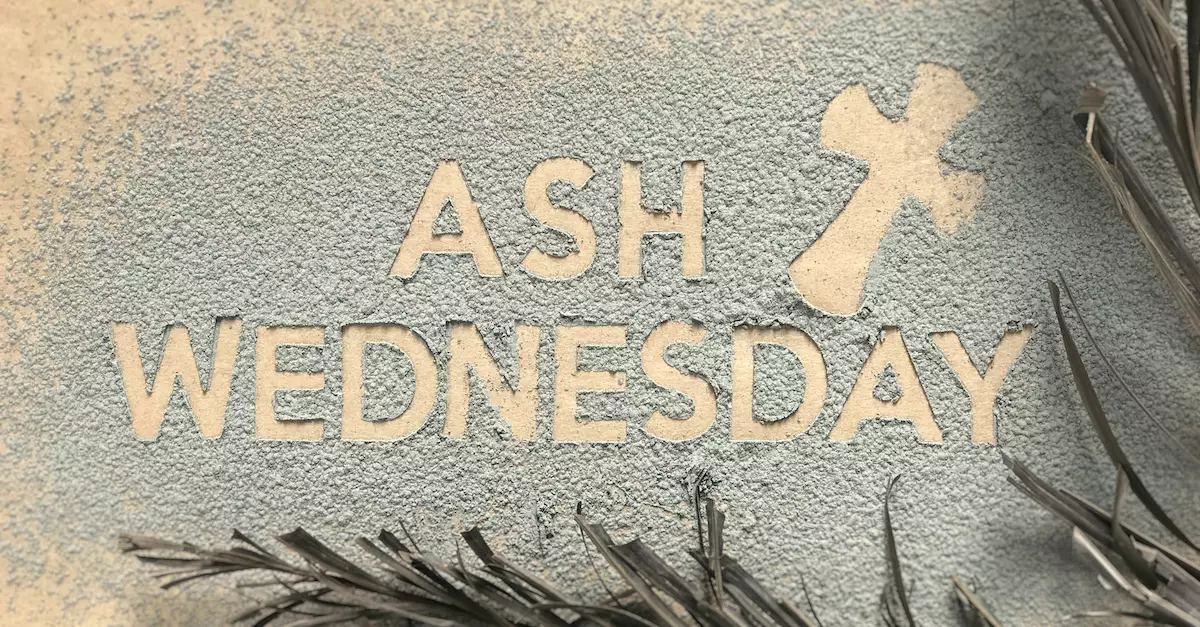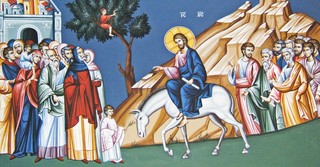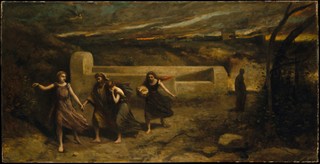What is Ash Wednesday? The Meaning and Importance Explained
Share

You may have seen Christians, mostly Catholics, walking around with a smear of ash on their foreheads and wondered what it meant. Let's look at the meaning of Ash Wednesday, why people wear ashes, and how Christians observe Lent.
What is Ash Wednesday?
Ash Wednesday marks the beginning of Lent, a 40-day period of fasting, repentance, and spiritual preparation leading up to Easter. Traditionally observed by Catholics and now embraced by several Protestant denominations, Ash Wednesday serves as a solemn reminder of human mortality and the need for repentance.
During Ash Wednesday services, a priest or minister applies ashes in the shape of a cross on the foreheads of worshippers, often while reciting the words: “Remember that you are dust, and to dust you shall return” (Genesis 3:19). The ashes, typically made from the burned palm branches of the previous year’s Palm Sunday, symbolize grief over sin, humility before God, and the hope found in Christ’s sacrifice on the cross.
Ash Wednesday also sets the stage for Lent, a season reflecting on Jesus' 40-day fast and temptation in the wilderness (Matthew 4:1-11). The day before, known as Shrove Tuesday or Fat Tuesday, is often a time of feasting before the fasting and discipline of Lent begin. Many cultures celebrate with indulgent foods like pancakes or pastries as a final moment of enjoyment before the season of reflection and self-denial.
When is Ash Wednesday?
For 2026, Ash Wednesday will be observed on February 18th.
Ash Wednesday falls 46 days before Easter Sunday, marking the official start of Lent. Since Easter follows the lunar calendar rather than a fixed date, Ash Wednesday’s date changes each year. It always takes place on a Wednesday, but the specific date shifts between February 4 and March 10 depending on when Easter is celebrated that year.
What is the meaning of wearing ashes and where do they come from?
The ashes used on Ash Wednesday typically come from the burning of palm branches from the previous year's Palm Sunday celebrations, remembering when Jesus rode a donkey into Jerusalem as the crowd waved Palm branches. After Palm Sunday, the palm branches are collected, dried, and burned to create the ashes used in the Ash Wednesday service. These ashes are then mixed with a small amount of water or oil to create a paste, which is applied to the foreheads of worshippers in the shape of a cross as a symbol of repentance and mortality.
The ashes are used to keep us in mind of our humble origin and of how the body of Adam, our forefather, was formed out of the dust of the earth; also to remind us of death, when our bodies will return to dust, and of the necessity of doing penance for our sins.
While the ashes remind us that we will die and return to the ground, if we believe in Jesus, we will be raised with Him in glorious new bodies.
Is Ash Wednesday in the Bible and what does it have to do with Lent?
Although Ash Wednesday is rich in Christian symbolism, you won’t actually find it mentioned in the Bible. The tradition developed over time, starting with the Council of Nicea, which established a 40-day fasting period before Easter. There was some debate about when this period should start, but in the fifth century, Pope Gregory officially moved the beginning of Lent from a Sunday to Ash Wednesday. While the holiday itself isn’t directly from Scripture, its core practices—fasting, prayer, and repentance—are deeply biblical.
The heart of Ash Wednesday and Lent is about turning back to God. The 40 days of Lent reflect Jesus’ time in the wilderness, where He fasted and prepared for His ministry. For many Christians, this season is a time of self-reflection, letting go of distractions, and drawing closer to God as they prepare their hearts for Easter, the celebration of Jesus’ resurrection.
The story of Jesus’ temptation in the wilderness is found in Matthew, Mark, and Luke. After being baptized, He spent 40 days fasting while Satan tempted Him three times, trying to take advantage of His hunger and exhaustion. But Jesus stood firm, responding with Scripture each time and refusing to give in. His victory over temptation is a powerful reminder that we can rely on God’s Word and strength in our own struggles, too.
Who can receive the ashes?
You'll see a diverse group of people receiving ashes on Ash Wednesday. It's not just for Catholics; many Christian denominations, including Anglicans, Lutherans, Methodists, and some Protestant churches, take part in this meaningful tradition. So, if you're wondering whether you can join in, the answer is likely yes.
For Catholics, it's a familiar and important part of their faith practice, welcoming everyone from infants to the elderly to receive ashes as a symbol of repentance and renewal. Non-Catholics and even those who aren't baptized are generally welcome to receive ashes, too. It's seen as a gesture of reflection and a step toward spiritual growth.
Kids often participate as well. Parents bring them along to receive ashes, introducing them to the themes of Lent from a young age. And in many places, you'll find ecumenical services, where different Christian communities come together, emphasizing unity and shared faith.
Why do people fast during Lent and do Catholics eat meat on Ash Wednesday?
Many people, including non-Catholics, choose to fast or give something up on Ash Wednesday as a way to reset spiritually and draw closer to God.
For Catholics, Ash Wednesday is a day of fasting and abstaining from meat, marking the beginning of Lent—a season of reflection and self-discipline leading up to Easter.
The Catholic Church has specific guidelines for fasting on Ash Wednesday and Good Friday. Fasting means eating only one full meal, with the option of two smaller meals that together do not equal a full meal. Snacking between meals is not allowed. Additionally, Catholics are required to abstain from meat, meaning they cannot eat beef, chicken, pork, or other land animals, though fish, eggs, dairy, and plant-based foods are permitted.
Not everyone is required to fast. The obligation applies to Catholics between the ages of 18 and 59, unless they have health conditions that make fasting unsafe. Abstaining from meat, however, applies to all Catholics 14 and older on Ash Wednesday, Good Friday, and every Friday during Lent. Those who are pregnant, nursing, sick, or have medical concerns are exempt from fasting. The purpose of these practices isn’t just about following rules but about focusing on God, practicing self-discipline, and entering Lent with a heart of repentance.
Use our 40-Day Devotional Guide to lead you in prayer and scripture reading through the Lenten Season!
What to give up for Lent
On Ash Wednesday and during Lent, you'll hear about people giving up all sorts of things, like sweets, coffee, social media, or even habits like gossiping or complaining. The idea is to let go of something that you enjoy or rely on, and use that sacrifice to focus more on your spiritual life.
The tradition of giving something up for Lent goes back to the 40 days Jesus spent fasting in the desert, facing temptations. By making a small sacrifice, people try to share in that experience and remind themselves of their faith's deeper meaning. It's not just about deprivation; it's about creating space for prayer, reflection, and acts of kindness.
Some folks might also take on new, positive habits instead of, or in addition to, giving something up. They might commit to daily prayer, volunteer work, or reading a spiritual book. The goal is to use Lent as a time for personal growth and to prepare their hearts for Easter.
Ash Wednesday Bible verses
While Ash Wednesday is not explicitly mentioned in the Bible, the phrase "ashes to ashes dust to dust" is commonly referenced on Ash Wednesday. The Scriptures referred to are from the Old Testament:
Genesis 2:7 - “God formed man of dust from the ground and breathed into his nostrils the breath of life, and the man became a living creature.”
Genesis 3:19 - “By the sweat of your face you shall eat bread, till you return to the ground, for out of it you were taken; for you are dust and to dust you shall return.”
Ecclesiastes 3:20 - “All go to one place. All are from the dust, and to dust all return”.
The following Scruptures teach about fasting:
Matthew 6:16-18 - “And when you fast, do not look gloomy like the hypocrites, for they disfigure their faces that their fasting may be seen by others. Truly, I say to you, they have received their reward. But when you fast, anoint your head and wash your face, that your fasting may not be seen by others but by your Father who is in secret. And your Father who sees in secret will reward you.
Isaiah 58:3-7 - ‘Why have we fasted, and you see it not? Why have we humbled ourselves, and you take no knowledge of it?’ Behold, in the day of your fast you seek your own pleasure, and oppress all your workers. Behold, you fast only to quarrel and to fight and to hit with a wicked fist. Fasting like yours this day will not make your voice to be heard on high. Is such the fast that I choose, a day for a person to humble himself? Is it to bow down his head like a reed, and to spread sackcloth and ashes under him? Will you call this a fast, and a day acceptable to the Lord? “Is not this the fast that I choose: to loose the bonds of wickedness, to undo the straps of the yoke, to let the oppressed go free, and to break every yoke? Is it not to share your bread with the hungry and bring the homeless poor into your house; when you see the naked, to cover him, and not to hide yourself from your own flesh?
Luke 4:1-2 - And Jesus, full of the Holy Spirit, returned from the Jordan and was led by the Spirit in the wilderness for forty days, being tempted by the devil. And he ate nothing during those days. And when they were ended, he was hungry.
The blessing of Ash Wednesday is the reminder that though we are born from dust and return to dust and that sin brought the curse of death to the world, on Good Friday, Jesus paid the penalty for the curse with his death on the cross. Our sins are forgiven on the cross. Then, on Easter Sunday, Jesus rose from the dead, and we have been given the gift of eternal life with Him in new heavenly bodies that will never turn to dust! Let's look at a few Scriptures that can encourage us on Ash Wednesday and throughout the Lenten season.
Can you wash off the ashes after Ash Wednesday church service?
Yes, you can wash off the ashes after Ash Wednesday services. There is no rule requiring you to keep them on all day. The ashes are a symbol of repentance, humility, and our mortality, but they are not a sacrament or something that must be worn for a specific length of time.
Some people choose to wear the ashes throughout the day as a personal act of faith or as a witness to others, while others may wash them off sooner due to work, school, or personal reasons.
Whether you keep them on for hours or wash them off right away, what truly matters is the spiritual meaning behind Ash Wednesday, not the outward appearance.















.800w.tn.jpg)



